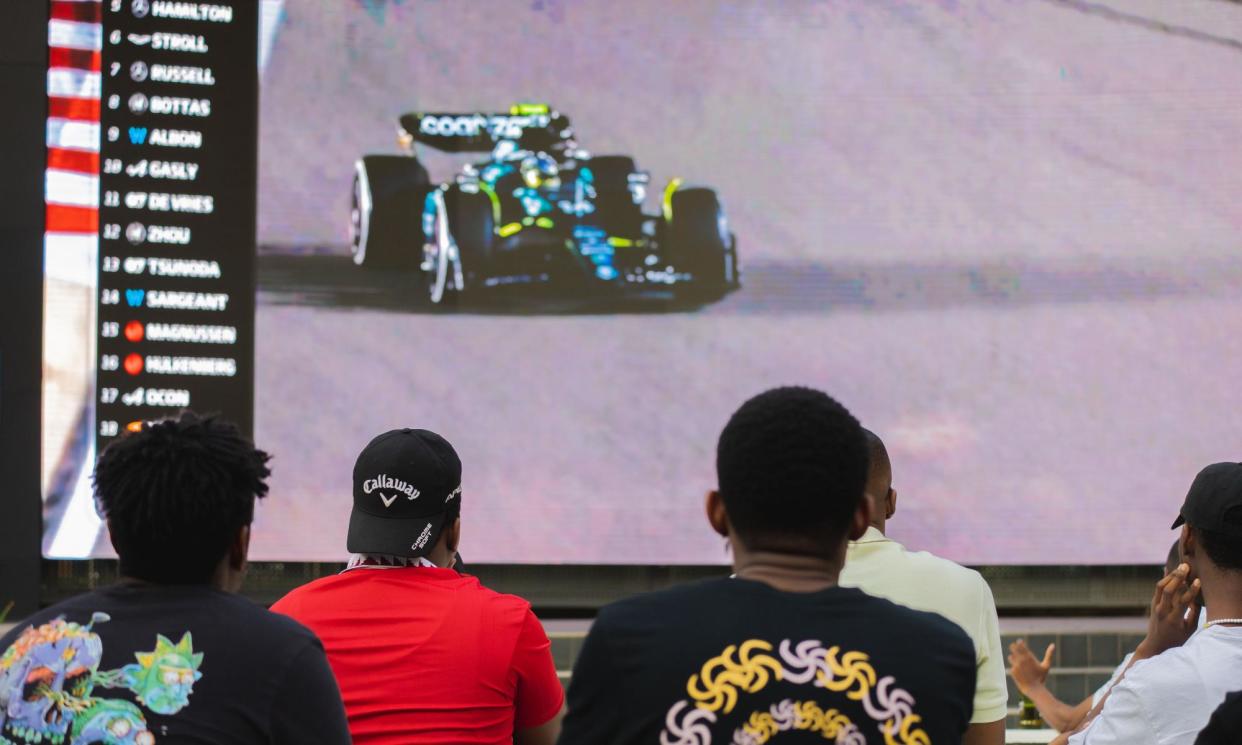‘We cannot ignore Africa’: F1 fans on continent add to Lewis Hamilton’s call for grand prix

Sandile Banks Ngwenya was bored and flicking through Netflix when he came across the series Drive to Survive, which chronicled Formula One’s 2018 season. It was March 2019 and he was immediately hooked – so much so that he flew from South Africa to Bahrain at the end of March for that year’s grand prix race.
“I just couldn’t believe how interesting the sport was,” said Ngwenya, 31, who lives in Johannesburg and works for his family’s hospitality business. “Now, as things stand, it’s number one on my list in terms of sports that I watch. The rest have been relegated.”
Ngwenya, who has also travelled to races in Brazil, Hungary, Italy, Singapore and Abu Dhabi, is part of a new wave of F1 fans in Africa calling for the sport to return to the continent for the first time since the 1990s.
Lewis Hamilton has been leading those calls, saying in August that it is long past time for an African country to host a race. “We can’t be adding races in other locations and continue to ignore Africa, which the rest of the world takes from,” the seven-time F1 world champion said, adding that he had been working with people in Rwanda and South Africa on potential races.
Hamilton, F1’s first black driver, was many African fans’ route into the sport, including Tshepi Tlhatlhogi in 2017. “I was searching everyone at the Met Gala, because I was obsessed with rich people that year,” she laughed. “When I saw Lewis, I went down the Formula One rabbit hole.”
Tlhatlhogi, 21, who lives in Bloemfontein, a smaller South African city, created an F1-focused TikTok account in late 2022 to find a community of like-minded people. She now has 46,000 followers on TikTok and Instagram on her @fastcarsgirl handle, and a private group chat with other young female fans from South Africa and Botswana. “The fandom has created such a loving environment for me,” she said.
While Drive to Survive was often credited with creating a new generation of F1 fans globally, social media was accelerating this growth, said Matthew Kanniah, a South African automotive content creator.
“It’s amazing to see, thanks to social media, people who weren’t interested before making an effort to watch it,” said Kanniah, 32, who works with the Red Bull team.
In Nigeria, Kamal Onyedikachukwu, 32, created F1 Naija in 2020. Each race weekend it hosts Spaces discussions on X, with anywhere from 250 to 1,400 attenders from across anglophone Africa and its diasporas.
In-person viewing parties are booming in Kenya and South Africa. Simphiwe Dlungwana’s Paddock Viewing events attract about 550 people in Johannesburg and he is in talks to expand to Cape Town and Durban. “Restaurants are now playing Formula One, as opposed to before it was just football and rugby,” said Dlungwana, a Hamilton fan.
Paddock Experience’s Nairobi events attract 500-600 people for afternoon races, about 40% of them women, and a “diehard” crowd of up to 200 fans for early morning or night-time races, said Mbalu Makau, the team principal of the company he founded in 2021.
“I don’t think Formula One is ready for Africa yet. I don’t think they know how many fans they have in Africa,” said Makau.
David Coulthard, a retired Scottish F1 driver, showed off a Red Bull car on Cape Town’s streets in 2019 and will drive in Johannesburg for a Red Bull event on 6 October. “We’ve been well received and there’s always been an appetite for more,” he said. Africa needs a race for F1 “to be a true world championship”.
F1’s chief executive, Stefano Domenicali, visited South Africa in 2022 for talks about returning to Johannesburg’s Kyalami circuit, which hosted the South African Grand Prix from 1967-85 and then 1992 and 1993 after apartheid ended.
Warren Scheckter, the nephew of Jody Scheckter, South Africa’s F1 1979 world champion, had worked since 2017 as the potential promoter for a renewed South African Grand Prix. His uncle blamed Kyalami’s owner, Toby Venter, for the race not returning.
Other media reports pinned responsibility on US disapproval of South Africa’s close relationship with Russia. None of the parties would comment on why talks fell through.
“National and provincial government departments need to work in concert with a well-funded promoter to realise a Formula One in South Africa,” a spokesperson for Venter said. “We remain keen to engage with other stakeholders to realise the dream of hosting a Formula One event again.”
There is now a vocal F1 advocate in South Africa’s national government – the new sports minister, Gayton McKenzie, who said on X that his term would be a failure if he did not bring F1 to South Africa.
I have set up meetings with relevant people already, my term will be a failure if I don’t bring one of the biggest sporting tourist events to South Africa which is F1. Our first meeting is end of August in Monaco. https://t.co/qzw2RnRYue
— Gayton McKenzie (@GaytonMcK) July 21, 2024
Meanwhile, Domenicali told Autosport magazine that he would meet Rwandan officials in late September to discuss their “serious” plan for a race on a permanent track. “We want to go to Africa, but we need to have the right investment, and the right strategic plan,” he said.
Rwandan authorities did not respond to a request for comment.
For African fans, the wait goes on. Kevin Matla, a 28-year-old microbiologist who makes TikTok videos about the sport, said a race in his country, South Africa, was the dream.
“I don’t know if I’d cry or get all emotional, but it would be amazing. Not only for me alone but for people in the country, who have been longing for such an event to come.”


